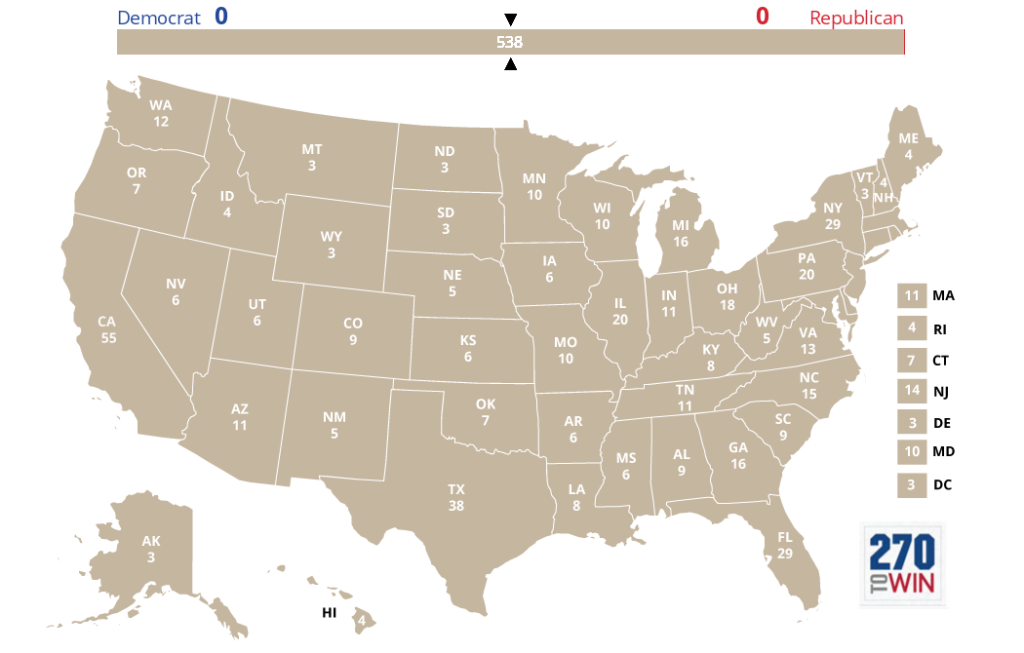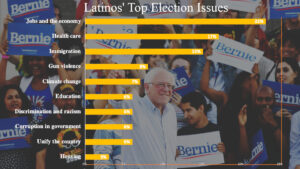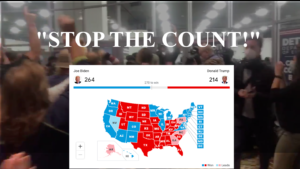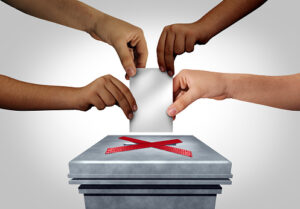“The electoral college is a disaster for a democracy.” – Donald J. Trump. Truer words have never been spoken by Trump. If you thought the 2000 Al Gore loss was unfair, well wait ‘till you hear how much our losing 2016 candidate won the popular by – 2.9 million votes. In fact, with our current electoral system, a candidate can win the presidency with just 22% of the popular vote when 78% of the country voted against them. The electoral college is an archaic system that focuses on winning states not people, corrupts the electoral process, contributes to the apathetic culture of low-political efficacy, and most of all suppresses the will of the majority – a concept this country was founded on. A system with a failure rate of 9% established by wealthy, elite, land-owning white men to protect their interests from the will of the people, shouldn’t be kept around. Women weren’t allowed to vote, slaves were counted as three-fifths of a person – but we somehow managed to overturn that, so why can’t we move towards proportional representation in electing the most important office in the United States? This is a bipartisan issue that we should all be fighting for once facts are established and common myths dispelled.
I’ll explain, according to the founder’s own words, why it was actually established and. First of all, remember who these founders were, they were wealthy, white, property-owning white men wanting to protect their own interests. Remember that the top 1% even back then owned 99% of the wealth? Remember Bacon’s Rebellion. They didn’t want a “tyranny of a majority,” to the antithesis of democratic values because they deemed too stupid to elect a leader. Alexander Hamilton spells this sentiment out in The Federalist Papers, saying it was designed to ensure a president is chosen “by men most capable of analyzing the qualities adapted to the station, and acting under circumstances favorable to deliberation, and to a judicious combination of all the reasons and inducements which were proper to govern their choice.”
Gatekeeping Elite Interests From Democracy
Things haven’t changed much (at the expense of everyone’s loss), even back then the elite were trying to prevent power from seeping out their inner-circle into the hands of those rebellious colonists who asked for too much – who asked not to be indentured servants. You see “tyranny of the majority” is simply a democracy, they ironically gave it the epithet ‘tyranny’ because a true democracy was detrimental to property-owning, white male interests. What we currently have now is true tyranny – power is disproportionately concentrated in low-populated states dubbed “swing states,” but more on that later. Just as they feared “tyranny of majority” they also feared black people and women voting, but we managed to overcome that.
A Vestige of Slavery
Not only was it established to protect elite interests and suppress the “stupid” masses, but it is a vestige of slavery. The father of the Constitution, James Madison, at the Constitutional Convention, expressed that with a popular vote, the Southern states, “could have no influence in the election on the score of Negroes.” This is how slave-owning Jefferson beat out John Adams in the election of 1800. With this and the three-fifths compromise, slaveholding states were able to increase their representation in Congress and also in the Electoral College. With slavery being abolished and the three-fifths compromise done away with, there was no reason to keep the electoral college. It’s simply indefensible. It was clearly designed to override the will of the people and preserve the power of the “white establishment” as Bill O’Reilly inadvertently argued against his cause. Thanks for confirming the de jure system of white supremacy that permeates our country Bill!
Furthermore, “minority rights” (that are not ensured by the electoral college at all) will always be protected considering that we have proportional representation in the legislative branch. That’s where one decides individual policy. When it comes to choosing president why shouldn’t everyone have one equal vote?
Even the positive, protective aspects of the system have failed us, proving there is no need for it. The electoral college was created precisely to stop unqualified demagogues, pawns of foreign powers, and an “ill administration”:
“… of those men who have overturned the liberties of republics, the greatest number have begun their career by paying an obsequious court to the people; commencing demagogues, and ending tyrants.” — Alexander Hamilton, (Federalist No. 1)
“the true test of a good government is its aptitude and tendency to produce a good administration,” and for that reason, he said, the electors should be “able to estimate the share which the executive in every government must necessarily have in its good or ill administration.” (Federalist No. 68.)
” the Constitution is designed to ensure “that the office of President will never fall to the lot of any man who is not in an eminent degree endowed with the requisite qualifications.”
In Federalist No. 68, Hamilton wrote that one major purpose of the Electoral College was to stop the “desire in foreign powers to gain an improper ascendant in our councils.” Saying the college should “Guard against all danger of this sort … with the most provident and judicious attention” from the electors.
It’s clearly failed considering we now have a historically unqualified, politically illiterate demagogue that also happens to be a pawn to a foreign power.
Myth: Big Cities Will Be Overrepresented
Let’s move on to debunking common myths that are sensible concerns. One person one vote, actually makes each vote count, there’s no such thing as big cities being “overrepresented,” a bigger population should account for a bigger portion of the vote, arbitrary ideological lines shouldn’t be decisive in a democracy. No, they also won’t be disproportionately pandered to – campaigning in cities only is a losing strategy. Our current system forces candidates to pander to “swing states” while ignoring the rest of the country’s interests. Having a popular vote decide the presidency means each person – not empty, overrepresented land – gets to have an equal say in deciding the most important position in the United States.
The benefits are inarguable, voter turnout increases because the cynical attitude of “my vote doesn’t count” is eradicated. Republicans will want to vote in California and Democrats can vote in Texas. The voice of the minority shouldn’t be more impactful than the voice of the majority just because you disagree with them; maybe candidates should just work harder to earn the unpopular party’s vote. Let’s back all of this up.
Small states actually have overwhelming power and their inhabitants’ disproportionately loud voices. In a proportional system, 574,000 people would be represented by one vote but our current system does the opposite. For instance, Georgia, Virginia, Michigan, and New Jersey are missing one vote. Pennsylvania, North Carolina, Ohio, Illinous are missing two, Florida is missing four, New York 5, and California 10. So no big states aren’t “tyrannical” – they’re actually underrepresented. One Virginia vote is worth 3 Texas votes, and one Wyoming vote is worth 4 Californian votes. Tell me, how this is in any way fair? When the electoral college was created, less than 5% of Americans lived in cities; today, it’s 80%. We’ve tripled the power of rural Americans, even though every American vote should be equal. Why wouldn’t we change laws in a changing world? Why are some individual’s votes worth less than others’ due to geography? The electoral college pretends fewer people live where they do and more people live where they don’t. To me that sounds like tyranny, true tyranny – tyranny of the minority.
A switch to proportional representation wouldn’t actually hurt small states. As aforementioned, campaigning in cities only is a losing strategy; candidates will not ignore 287 million other people. Such a notion ignores the mathematical reality of population distribution. The top 10 cities are 7.9% of popular vote and even the next 90 biggest cities are 19.4% of popular vote. To believe otherwise is ludicrous and an intellectually dishonest endeavour used to further one’s own agenda. It’s absurd that with our current system 80% of the vote cast in the country has no impact on the outcome of the election.
In fact, our current system already panders to few states: campaigns, with no need to win the popular vote focus on Ohio, Florida, Pennsylvania, Virginia and a few others. Furthermore, they don’t care about small states. Remember they can theoretically win with just 21% of the popular vote. This graph shows the states candidates most visited:
Supporters of the outdated system erroneously believe low-populated, rural states would be overlooked but with the current focus on a few “swing” states – the other 37 and their interests are ignored by candidates. A direct election ensures that candidates represent the interests of all the people, not just the people in the swing states. Every state would become a battleground for voters, forcing candidates to run better campaigns in order to appeal to a broader swathe of the electorate. Currently they have no reason to do so – their focus is only on the six or so states that will determine the outcome.
Increased Voter Turnout
Our indirect electoral process suppresses voter turnout. Changing it would cause the true silent majority in states like Texas and California to vote, because there would be no wasted votes. The past 2012 election results point to this, even with our “wasted vote” system 3 million Democrats voted in Texas and 5 million Republicans voted in California. If electoral votes were awarded proportionately, 16 Texan votes should have gone to Obama, and 20 to Romney. But to everyone’s detriment, with the winner-take-all system, those who vote for losing party might as well stay home.
Undemocratic Faithless Electors
To add final blow to the system with 9% failure rate, there’s also the concept of faithless electors. Which we know for certain where created to willy-nilly vote against anyone who disagreed with elite interests since they truly didn’t protect us from a foreign influence, demagogue, or unqualified candidate this election. Faithless electors, exemplify the fragility of our democracy, at any instance, they can easily go against the people’s wishes with just a fine. They capture the real essence of why the college was founded – as a blockade between the American people’s interests and elite interests.
The hypocrisy of Electoral College loyalists is amusing, they sure rallied against it back in 2012, didn’t they? But all of the sudden their candidate loses the popular vote by a historical number and they defend it. Once again proving them to be spineless, self-serving, hypocritical
You can’t really blame them, their own savior is a guy known to flip-flop on abortion, health care, etc. A poll of more than 40% of Trump voters even said California’s vote shouldn’t count. That’s right, the most populated state in the country shouldn’t count. Why? Well because I don’t like “them.”
The Electoral College Crowns Popular Vote Losers
I’ve already explained why yes, the most popular party with the most votes should win, and no big cities won’t decide elections since it’s a losing strategy and they only account for 20% of the population, but I want to be clear that abolishing it won’t ensure democrat dynasty for the rest of time. The five electoral failures throughout history where a candidate has lost the popular but won the presidency have gone to republicans. It happened in 1824, 1876, 1888, 2000 and now, 2016.
The electoral college often helps Republicans in close races. Abolishing is not in any way ‘unfair,’ nor does it give coastal states disproportionately loud voices; currently, small states have that not the other way around. One person, one vote is true “popular sovereignty” and a “government for the people by the people.” Would it matter if those 8 million New Yorkers were geographically dispersed all around mid-western rural states? You see, this isn’t about a concentration of power, this is about ‘your side’ losing. With a popular vote, no state will be overrepresented because it’ll just be about the people and for the people not empty, overrepresented land as it is now. Even then, why should the minority rule if one party is more popular than the other? Because again, this isn’t about so-called “tyranny” it’s blatant fear of your side losing.
Forget the arbitrary construct of “red states” or “blue states,” if California voted 60% democrat, and 40% Republican, 32 votes out of their 54 be cast for the Democratic candidate and the remaining 22 be cast for the Republican candidate. Lower populated areas simply shouldn’t get an equal shot to higher populated areas because their viewpoints are not as popular. That’s just popular sovereignty.
To put it in layman’s terms, a farmer from Ohio can still vote for his concerns and his voice won’t be overrepresented as it is now, or underrepresented. The farmer’s voice will weigh just as much as each American individual, whether there are enough individuals that lean his way is a different story. One that is the responsibility of the candidates running for the presidency. This is where yet another benefit comes in, since every vote is weighted equally, candidates will be more responsive to the concerns of the entire citizenry not just swing states, and therefore will try to win their vote. Which is precisely why abolishing it does not guarantee purely democrat presidents. Not only will voter turnout increase, therefore upping the number of republicans voting in traditionally blue states, but republican candidates that would usually lose the popular vote won’t always because they’d have reason to campaign in former “blue states.” It’s up to the candidates to do a better job with resonating with the entire country, because they’re not just governing Ohio, Florida, Pennsylvania, and Virginia, they’re leading the entire country.
Abolishing is no simple process that will happen in the foreseeable future, which is why we should fight for proportional representation in the electoral college.That way, a narrow 1.2% win in Florida will not yield a 29 electorate gain for one candidate. So that a candidate doesn’t just need a fifth of the popular vote to win, so that voter turnout increases, so that 80% of the vote cast in the country isn’t inconsequential to the outcome, and so that 37 states aren’t ignored. Most of all so that the highest office in the United States makes an effort to represent all the people regardless of what state they come from.








Leave a Reply